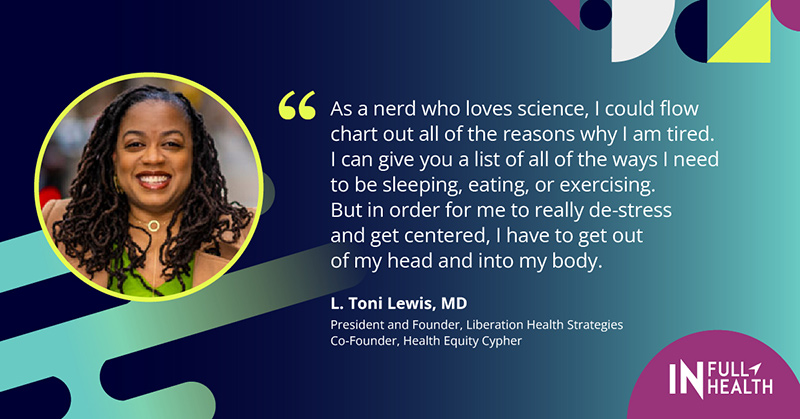L. Toni Lewis, MD is the President and Founder of Liberation Health Strategies and the Co-Founder of Health Equity Cypher.
Liberation Health Strategies is a consulting agency that works with both individuals and organizations to operationalize and incorporate strategies for health equity and justice on a community, national, and global scale.
In the second part of the Stress Series, Dr. Lewis shares how she makes mental health a key focus in all aspects of her work — and what practices support her own mental wellness.
Check out these resources to help your solution or organization design solutions to reduce mental health disparities.
In Full Health (IFH): You’ve worn (and currently wear) a number of hats, so how did you come to be in the position you are — and what has inspired you along the way?
Dr. L. Toni Lewis: I am a country girl who grew up in rural southern Illinois in a town with a population of 900, who grew up watching health inequity and health injustice in action. I saw all of these strong, wonderful Black folks that I grew up with — including my mom, my grandparents, and other elders in my community — many who migrated from the South, who had grown through all of the injustices due to the enslavement of our ancestors, AND who were doing these amazing things. They were teaching and organizing and traveling and creating space for others and just fully living their lives. But when they would engage with the health care system, they’d be treated like crap, often treated like less than human.
As a child, I decided that I wanted to flip tables and systems to keep that from happening. I wanted to create spaces that respected and loved and appreciated the people that I knew.
So, I went to DC for college and med school, and I learned about systems and health disparities. Then I came to New York for residency and internship, which is where I got deeply involved with labor and politics because those things were all intersecting while I was in residency.
I’ve always been kind of a multihyphenate — not just a doctor, but a doctor and an artist and an organizer, and simply a human citizen.
IFH: What challenges were you trying to address through the creation of Liberation Health Strategies and Health Equity Cypher?
Dr. L. Toni Lewis: When I was working on policy strategies around health care, I would always hear from young Black and Latino women what they were going through — the microaggressions at work, the inequities that can happen when you’re the only person in the room who looks like you, what stress lands like in your body, mind, and spirit.
I began to think about what it is we need. I asked myself, “What are the things that allow us to affect change, to innovate, to revolutionize?”
Dr. L. Toni Lewis
President and Founder, Liberation Health Strategies | Co-Founder, Health Equity Cypher
Both Liberation Health Strategies and Health Equity Cypher were created to allow space for other like-minded entrepreneurs and co-creators to try new ideas out. It’s informed by my history in medicine, in labor, as an entrepreneur, as a person — but also by the many experiences of the other Black women I’ve worked with.
SUBSCRIBE
Stay in the loop about new blog posts from equitable health innovation leaders, helpful resources and tools to help you bring the Principles to life, upcoming events, and more by joining our email list.
SUBSCRIBEIFH: You also have worked as a Wellness Coach for the Higher Heights Leadership Fund which aims to strengthen Black women’s leadership capacity in politics. What is it like to support Black women leaders in this way — and why is it so important?
Dr. L. Toni Lewis: I love supporting those who support others. And, if we look at health inequity data, it will show that Black women catch it all. Whether it’s heart disease, maternal mortality and morbidity, or psychological stress. I love Higher Heights, which was founded to genuinely support Black women running for office like Stacey Abrams and Lauren Underwood.
As a Black wellness coach/advisor, I can offer support rooted in a person’s full truth and purpose without guilt, shame, or judgment. That often means providing an immersive experience within our time for them to breathe. I mean, how often are you in back-to-back Zoom meetings and you don’t even get 15 minutes to breathe? If I can concede some of my speaking/coaching time to allow someone to go get a cup of water or their favorite pillow or to do a “body scan,” that is absolutely one hundred percent part of what I feel is mental health and wellness.
IFH: Can you speak a little bit about your practice in yoga and dance? How do these play a role in your own mental health?
Dr. L. Toni Lewis: As a nerd who loves science, I could flow chart out all of the reasons why as a Black woman physician entrepreneur multi-hyphenate, I can be mentally, physically, and/or spiritually tired. I can discuss at length the role of intergenerational trauma, microaggressions, economic pressures, secondary trauma, compassion fatigue, and all the things.
I can also give you a list of all of the ways I need to be engaging my self-care tools — including sleeping, eating, or exercising. But in order for me to really de-stress and get centered, I have to get out of my head and into my body. That comes in part from my mama, and from lessons as simple as her turning on the music when we needed to clean the house or taking a walk outside in the sunshine.
When I chose residency, I chose to be in a city that had African dance around. I wanted to be able to stumble over one of my favorite tools. You’ve got music and movement and intention — for me, it’s one of the best ways to connect with my body, spirit, and soul. Find the form of centering that works for you, even if it is just taking a walk in the sun.
IFH: What role can health innovators play in creating solutions to support mental health?
Dr. L. Toni Lewis: Our world is going through so much at this moment. Run the list of historic mental, physical, spiritual, societal, and economic challenges, and it can get to be a bit much. With that in mind — and understanding that communities that have been historically marginalized and exploited are experiencing this moment in devastating ways — society needs our health innovators to accelerate innovation in all mental health and wellness strategies. Our current ecosystem is not equipped — we need all hands on deck.
Think about bringing your full mental, physical, and spiritual experience as a human being to all of your work — which includes what your family’s going through, what you’re going through, what people in your community, the community you’re serving, are going through. What are the creative and innovative ways you and your community are tending to your full mental, physical, and spiritual health needs? Bring that into your innovation and into your work. You’ll come up with solutions. Create space for mental wellness and joy in your own operation as well.
Ask your co-collaborators and your co-creators, “What is it that you need on this particular day for your mental health? What tools do you have that are really working for you? How are you feeling? Do you need more space or do you need more conversation?” I invite people to bring their full selves and their mental health experiences to every table. Ask the people around you what they need, bring it into every space you’re in and simply ask, “What can we do with this? What can we do about this?”
SUBSCRIBE
Stay in the loop about new blog posts from equitable health innovation leaders, helpful resources and tools to help you bring the Principles to life, upcoming events, and more by joining our email list.
SUBSCRIBE


Comments are closed.